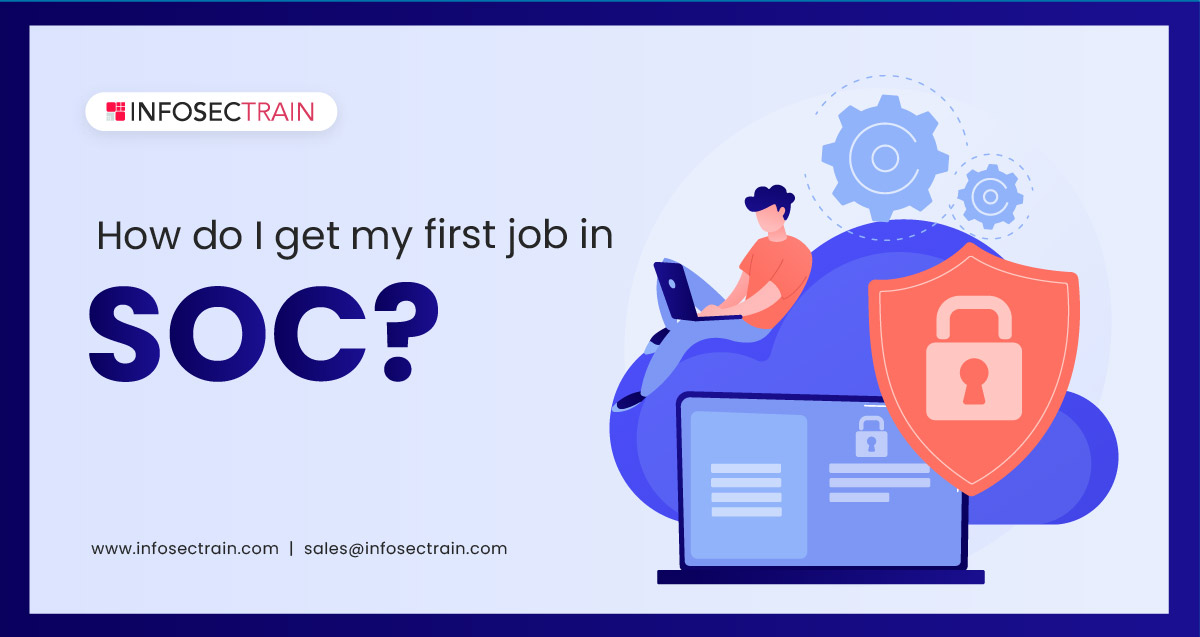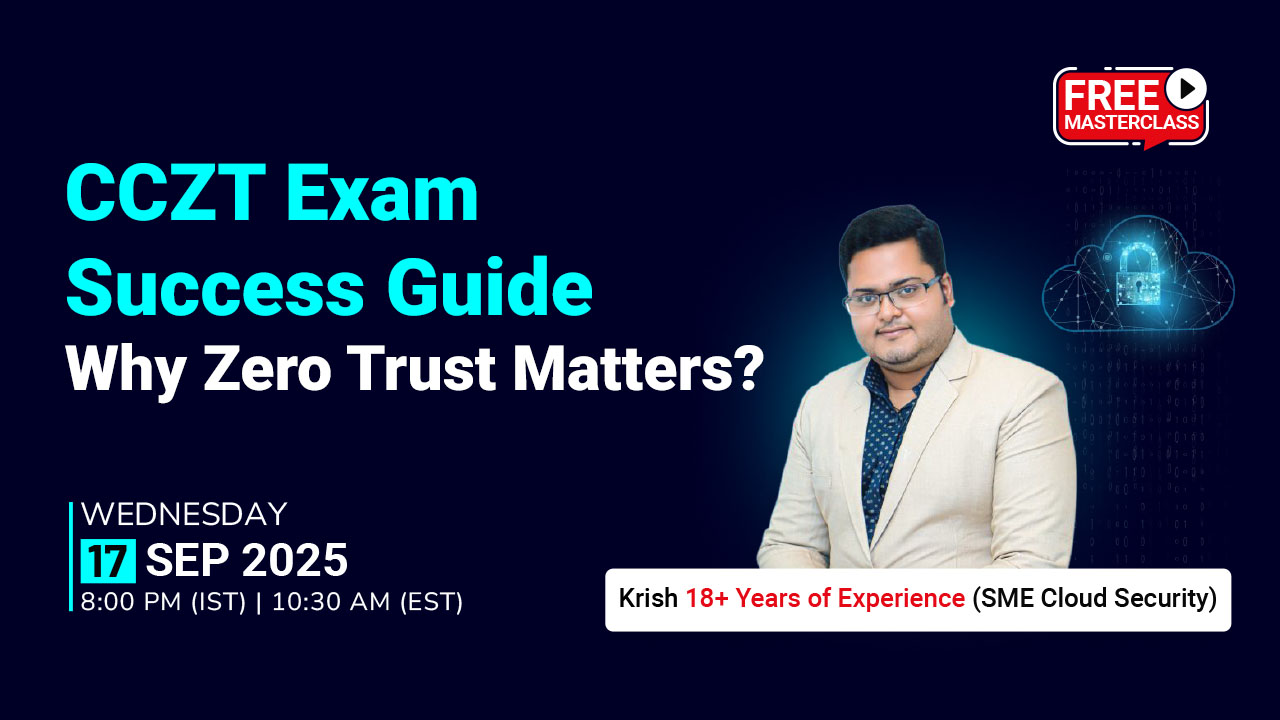How Do I Get My First Job In SOC?
A Security Operations Center, abbreviated as SOC, is an essential component of a data protection and security system that helps lower the level of risk that information systems face from external and internal threats. SOC is one of the hottest job markets nowadays since the threat landscape has expanded with the rapid pace of digitalization. More and more professionals desire to start a career in SOC.

So, if you have questions like “How do I get through the first interview into SOC?” or “What is the best course of action for me if I want to start a career in SOC?” then you have come to the right place.
In this article, we are going to cover everything you need to consider and prepare for your first job in the SOC.
But before we begin, let us understand why you should choose a career in SOC in the first place.
Why is SOC expected to be a hot job market?
Why are cybersecurity and SOC one of the most acceptable professions right now? We all know that money is always the primary motivator when someone considers a career. Therefore, the reason is really simple: a job in SOC provides a lot of money.
Apart from the money, the exhilaration you will experience is unlike anything we have ever witnessed in any other work. Every job has its benefits and drawbacks, but cybersecurity gives you the impression of being a digital cop. As a SOC Analyst, you can keep your firm secure, which offers you a sense of accomplishment.
A lot of people are working from home after the Covid-19 pandemic. Everything has essentially become digital, with an increase in a lot of business activities transferring to the cloud. Threats and attacks are increasing since the market is flooded with ransomware, malware, and trojans of all kinds. The opportunity in cybersecurity, such as a demand for SOC, is significant.
SOC has many opportunities, majorly in the Middle East, the United Kingdom, and India. There are plenty of opportunities in the government as well as the private sector.
Who is the ideal candidate for the SOC?
SOC is open to everybody, and it is not mandatory to have a technical background to get started. It barely matters if you come from product development, specialized, non-technical, or other sectors. However, it helps a lot if you already work in security in some form, such as application security and network security, because the SOC effectively amalgamates all the security measures you have implemented.
There is also no correct or incorrect age to begin SOC.
Career opportunities in SOC:
Right now, everyone wants to do something related to cybersecurity. There are many fields within cybersecurity, including consultancy, operations, integration, and various areas within SOC. You can be a SOC Architect if you enjoy integrating things or a SOC Analyst if you prefer to analyze things, such as going through logs and evaluating them. As a result, the sky is the limit.
Companies that hire freshers:
There are many companies that hire SOC professionals; the major ones are:
- HCL
- Infosys
- TCS
- IBM
Knowledge required to become a member of the SOC team:
The willingness to learn is the first thing you will need. We all live in the digital era where everything is virtual, everything is available online, and you can get any information you desire. This medium can be used by anyone from any experience to advance their career to the position of a SOC Analyst.
- Basic knowledge of computers: You must have a basic understanding of how computers work.
- Network fundamentals: You should have a fundamental knowledge of networks, including how to connect two computers, network protocols, the OSI model, and the TCP/IP model.
- Fundamentals of operating systems: You should understand the basics of Linux and Windows operating systems. Learn how to use the Linux operating system because most security tools are run on one of the Linux distributions. It will prepare you for a variety of SOC employment opportunities.
- Basics of SOC architecture: You must understand the fundamentals of SOC architecture. Before learning about SOC architecture, you must grasp the concept of defense in depth.
- Hands-on with Linux OS: You should get hands-on with Linux OS. You can use virtualization software such as VMware and VirtualBox to run an OS on top of it, such as any Linux variant, and then see how to run the fundamental commands that you would use on a Windows GUI. Open the command prompt in Windows OS and see if you can accomplish anything you can do in the GUI through the CLI; a simple example is whether you can see and close a task from the CLI.
To safeguard your system, you must first comprehend them. Like, if you desire to be a chef, you must be familiar with the ingredients and flavor of the dish. Similarly, if you want to be a SOC professional who protects an organization’s services, applications, data, and other assets from attack, you must first understand what it is. Only then can you secure it. So, you must have a good grasp of all the basic concepts.
Some of the things to consider when preparing for your first job in SOC:
- Find a SOC course, and look for vendors who offer SOC training. Investigate it. You can inquire from someone who is already part of a SOC team.
- When it comes to certifications, you should take a calculated approach. There are hundreds of thousands of certifications available, and you will never be able to complete them all. Certificates are beneficial to some extent, but they are not sufficient. Choose the one that aligns with your desired role.
- When it comes to SOC, start with small businesses like NI, Paramount, and others. They are seeking SOC freshers; the pay will undoubtedly be lower, but your package will drastically improve after one year of experience.
- Make an effort to engage with SOC professionals, plan a meeting with them, and learn how things work. You can reach out to anyone for assistance over the internet. Use LinkedIn to its most tremendous potential. They would not be able to tell you everything, but they will be able to point you in the correct direction and provide you with resources.
- Internships are usually beneficial. After gaining experience, you can apply for a full-time position.
- Do not go through HR; instead, go straight to the SOC professionals, develop a relationship with them, build a solid rapport with them, and demonstrate your work and capabilities to them.
- The first thing that is evaluated for your profile is your CV. You can include someone with good writing capabilities or content writers in the preparation of your CV. Your CV should be brief and to the point. Mention any courses you have attended, certificates you have earned, blogs you have written, non-profit pages, or channels you have created.
- In your CV, do not include any misleading information. You should not include your personal information such as hobbies, marital status, family background, likes and dislikes, and so on.
- Begin sharing your articles and case studies.
What is the best strategy to ace your first job interview in the SOC?
You should be prepared for two phases:
Phase 1: When the interviewer asks fundamental questions or talks about yourself.
Remember that the first 5-10 minutes of the interview will be spent in your first phase, so be concise in your response and do not go into too much detail. Your answer needs to be a one-liner.
The following are some of the most commonly asked questions:
- What is malware?
- What do you understand by phishing?
- What is SIEM?
- What is defense in depth?
- Which operating system do you prefer?
- What is the full form of MSSP?
- What is the full form of SaaS?
Important topics to consider in an interview:
- Malware
- ICMP
- Firewall
- Windows operating system
- Linux fundamentals
- Linux architecture
Essential tools to prepare:
- QRadar
- Wireshark
- Zeek (an open source IDS)
Phase 2: It will be based on a scenario. Now there is room for an explanation; this is when you can maintain control, remain calm, consider a decent response, construct a scenario, and explain it.
Know that you are halfway through the interview when the interviewer gives you a scenario, and you are 50% selected in that organization. You have to use that scenario to build an example and be detailed with your examples now.
Do’s and don’ts in an interview:
When it comes to interviews, be very strategic. There are a few considerations to keep in mind:
- Formal attire is essential. You should dress professionally; you cannot show up for an interview in a T-shirt and sit as if you are having an informal conversation.
- Develop and enhance your soft skills.
- Be straightforward with your responses; otherwise, you will not only waste your valuable interview time, but you will also provide the interviewer with more and more words to exploit.
- Do not use phrases like “like,” “you know,” and “it depends.”
- Do not use similar words over and over.
- Do not begin your response with the phrase “it depends.”
Remember, it does not matter if you are a technical expert at an interview; what counts is whether you can present yourself in a short span and speak about yourself. No interviewer will turn you down if you can articulate yourself well.
Final words:
We hope that this article has provided you with some valuable information on how to prepare for your first job in SOC. If you have decided to pursue a career in SOC, InfosecTrain is here to help. We offer customized SOC Analyst, SOC Specialist, and SOC Expert Combo training courses to help you prepare for the various SOC roles. We help you build the skills and knowledge required to land your first job in SOC.
Furthermore, if you want to gain visibility into the step-by-step process of making a career in SOC, you can refer to the following:
We wish you the best in starting your career in SOC!







 1800-843-7890 (India)
1800-843-7890 (India)